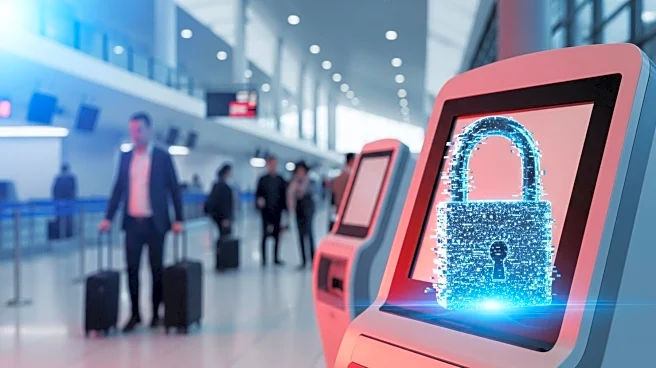What's Happening?
A cyberattack has caused significant delays at several major European airports, including Heathrow Airport in London, Berlin-Brandenburg, Brussels, and airports in Dublin and Cork. The disruption, which began on Friday evening, affected the check-in systems provided by Collins Aerospace, an American company. As a result, passengers experienced longer waiting times for check-ins and boarding. The parent company, RTX, confirmed the cyber-related disruption and stated that efforts are underway to restore full functionality. In the meantime, airport staff have been instructed to use manual check-in processes to mitigate the impact on travelers.
Why It's Important?
The cyberattack highlights the vulnerability of critical infrastructure to digital threats, emphasizing the need for robust cybersecurity measures in the aviation industry. The incident not only disrupted travel plans for thousands of passengers but also raised concerns about the security of technological systems that are integral to airport operations. The reliance on digital systems for efficient airport functioning means that any disruption can have widespread consequences, affecting airlines, passengers, and airport staff. This event underscores the importance of investing in cybersecurity to protect against potential threats that could lead to significant economic and operational impacts.
What's Next?
Airports and airlines are likely to review and strengthen their cybersecurity protocols to prevent future incidents. The aviation industry may see increased collaboration with cybersecurity firms to enhance system resilience. Additionally, regulatory bodies might consider implementing stricter cybersecurity standards for companies providing critical infrastructure services. Passengers can expect temporary adjustments in check-in procedures as airports work to restore normal operations. The incident may also prompt discussions on the need for contingency plans to handle similar disruptions in the future.
Beyond the Headlines
The cyberattack raises questions about the ethical responsibilities of companies providing critical infrastructure services. It also highlights the potential for geopolitical tensions if such attacks are linked to state-sponsored actors. The incident could lead to increased scrutiny of cybersecurity practices across various sectors, not just aviation, as industries recognize the interconnected nature of digital threats.









